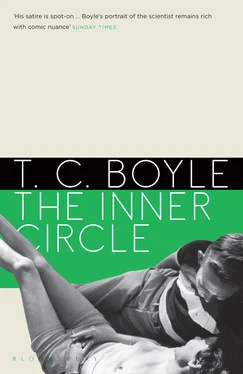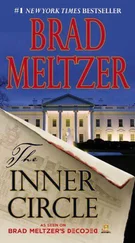“Iris,” I said, “Iris, it’s me,” and she started, her eyes flashing wide, the instrument pulling away from her lips with a long filament of saliva still attached. It took her a moment, and then she smiled, and I said, “Playing the clarinet again, huh?”
“Come here,” she said, and I sat beside her and we kissed, John Jr. scrambling up into my lap and the cat appearing from nowhere to adhere to the arm of the chair. It was a sudden joyful moment, the return of the hero, and I felt my depression begin to lift. We let the moment stretch out a bit, and we said the usual things to each other, and I filled her in on the highlights of the trip, the scare at San Quentin and Prok’s mastery at Berkeley, and we had a drink together and I gave John Jr. the box of Crackerjack I’d brought back for him and dug out the lacquered nautilus shell I’d got at a seashore gift shop for Iris, and then, after a silence, I came back to the subject of the clarinet.
“So what prompted you to start playing again?”
Iris gazed up at me over the rim of her glass. She’d made herself a gin and tonic, though it was cold still and would be for some time yet. The instrument lay tucked in against her shoulder, the reed and mouthpiece wet and glistening, the keys shining, the long black tube cutting like a shadow across her arm.
“I don’t know,” she said, shrugging, “something to do, I guess. You know, to pass the time.”
There was the hint of an accusation here, the old argument, and the anger came up in me. “You left the car out there with a flat. You didn’t drive on it, did you? Tell me you didn’t drive on it.”
She ignored me. The glass went to her lips and came away again. “And Hilda. She encouraged me — she plays herself, you know, and we’re planning on getting up a duet for the picnic this spring, on Memorial Day, maybe, just Hilda and me. I didn’t think I’d get my embouchure back, but I have.” The fire gave a sigh, then subsided, because it was built of twigs instead of the painstakingly split oak that was stacked up in the woodshed perhaps fifty feet from where we sat. “I wanted to surprise you.”
“I didn’t know Hilda played.” I tried to picture Rutledge’s wife, angular and airily blond, with her stingy lips and small high breasts, perched at the edge of a chair with the sheet music spread before her, taking the instrument into her mouth.
“All through college. Like me.” She smoothed her thumb over the pale glistening surface of the reed. “We’ve got to do something, what with our men gone all the time.”
“Oscar was here.”
“Yes,” she said, “that’s right. But you weren’t.”
At this point, John Jr., who’d gone back to his toys, looked up and announced that he was hungry. “Mommy, I’m hungry,” he piped, as if he’d just discovered some essential truth about the nature of existence and himself in particular.
“Maybe we should just go out,” I said.
Iris gave me a look. “Can we afford it?”
“Something cheap. Hamburgers. A pizza.”
“Pizza!” John Jr. cried, taking up the refrain. “Pizza!”
“Hush,” she said, and he’d flung himself at her legs now, burying his head in her lap. “There’s no reason why I can’t whip something up, because we really don’t have to make a celebration of it, do we? I mean, you go away and you come back. Isn’t that the way it always is?”
I had nothing to say to this, and we sat there a moment in silence, even as John Jr. tugged at her blouse and keened, “Please, Mom, please?”
“I’d have to change,” she said. “And put on some makeup. And I do want to get right back—”
I tipped my glass to her. “For what — more practice?”
She was smiling now, John Jr. all over her— Please, please —something playful in her eyes, as in all is forgiven and why wrangle when love, the love between us, between two young healthy male and female human beings, was so much more than the sum of its losses and hesitations. “No,” she said, “it was something else. A statistic you could maybe help me with because it’s been a while.”
“Yes?”
“What was the average frequency of s-e-x”—spelling it out so that our son wouldn’t make a pet word of it, as he had with “bra” and “jock”—“for couples married at least five years? Once a week, wasn’t it?”
“Oh, no,” I said, wagging my head in a professorial way, “it’s at least twice that.”
The next day, at work, Rutledge and I took a coffee break together, and that was when I learned about Elster. We’d started out on the subject of the clarinet — I’d said something like, “I hear Hilda’s rediscovered her musical inspiration”—and then we’d gone on to discuss the Pacific Coast trip and how happy he’d been to stay behind this time because he really was getting tired of conducting interviews like a hired hand (“No offense, John”) when he thought he’d been taken on to do original research. As Prok’s equal, or at least his partner. And then, casually, as if it didn’t matter a whit, he dropped the news about Elster.
I was dumbstruck. “Elster?” I repeated. “But he’s, well, he’s no friend of the research. He — did I ever tell you about Fred Skittering, that whole incident?” And I told him, at length.
Rutledge was imperturbable. That was his chief characteristic. The building could be on fire — his hair could be on fire — and he wouldn’t raise his voice or move any more precipitately than he would at a funeral. I remembered the night in the hotel room with Mac and how he’d squared his shoulders and strolled into the bedroom with her as if it were a military matter, orders given, orders received. But now, as I revealed Elster’s perfidy — or his potential for it — his face took on a new look altogether. Finally he said, “You don’t think he can be trusted then?”
“No,” I said. “I don’t.”
He stroked his mustache, glanced down the hall to see if Prok were in sight, and lit up a cigarette. I watched him shake out the match, drop it to the floor and grind it underfoot. “Well, we’ll just have to be careful, that’s all, make a note of it, be sure Prok’s aware of the situation, because really, nobody’s in on anything here except for us, and I don’t have to tell you how the shit would hit the fan if anything, even the least tidbit, got out to the public. But look at Mrs. Matthews and the other women we’ve taken on, Laura Peterson and what’s her name. They haven’t got a clue, have they? And they’re right there with us every day in the office.”
I wasn’t convinced. Maybe I was overreacting, maybe I’d misread the man — but then there was that night at the tavern when he tried to get me to talk, and it wasn’t even for his own sake, but for some third party’s, for a journalist’s. Had he been paid off? Or was he just constitutionally a snake?
“By the way,” Rutledge said, squinting against the smoke of his cigarette and taking a sip from his coffee mug at the same time, “did you hear about the musicale Sunday?”
I held out my palms in response, and I suppose I must have looked bleak over the prospect. “Uh-uh,” I said finally. “No.” It wasn’t that I didn’t enjoy the opportunity to learn about classical music — as I say, I’ve really come to appreciate it, even opera — but that the musicales seemed just another extension of work, of the Institute’s tentacles. And Iris hated them. “I don’t know,” I said. “I’m tired. I’ve had it up to here with musicales, if you want to know the truth.”
Rutledge was watching me steadily, his lips composed round the butt of his cigarette and the thin tracery of his mustache. “Yeah,” he said, “I know what you mean. But something’s up — it’s going to be just us. And the wives.”
Читать дальше












